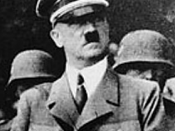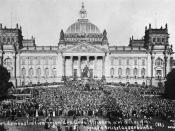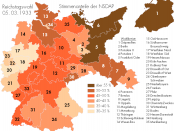Hitler's rise to power was based upon long-term factors - resentment in the German people, the weakness of the Weimar system - which he exploited through propaganda (paid for by his rich, Communist-fearing backers), the terror of his storm troopers, and the brilliance of his speeches. During the 'roaring twenties' Germans ignored this vicious little man with his program of hatred. But when the Great Depression ruined their lives, they voted for him in increasing numbers. Needing support, and thinking he could control Hitler, President Hindenburg made the mistake in January 1933 of giving Hitler the post of Chancellor.
Deep anger about the First World War and the Treaty of Versailles created an underlying bitterness to which Hitler's viciousness appealed, so the Germans gave him support. Many Germans couldn't accept that they were the losers of WWI. With the Treaty of Versailles, they felt like they had been humiliated. For millions of German's the Weimer Republic itself was identified with their country's shame and weakness.
Democracy in Germany failed because there were too many political parties and no one party could get a majority. Also the president had too much power, and no support. Weaknesses in the constitution crippled the government. In fact, there were many people in Germany who wanted to return to a dictatorship. The conditions in Germany were horrible. The cost of living was high, the wages were low, no provision or savings. With the Weimar Republic weak the Nazi Party became very appealing. The Nazi party promised restoration of the economy, profits for the industrialists, jobs and food for the Germans, an end to the shame of democracy, the prevention of racial contamination, and to reunite all Germans. With all these views being appealing to so many Germans, the Nazi's became a powerful party.
Once Nazism...


